People revere the God of Wealth, believing that he will bless them with success in their business endeavors. However, over time, the altar dedicated to this deity can become infested with termites, moldy, or simply deteriorate with age. Therefore, it is essential to know the proper way to dispose of the old altar and establish a new one. Let’s delve into the guidelines surrounding the altar of the God of Wealth.
1 What is the significance of worshipping the God of Wealth?
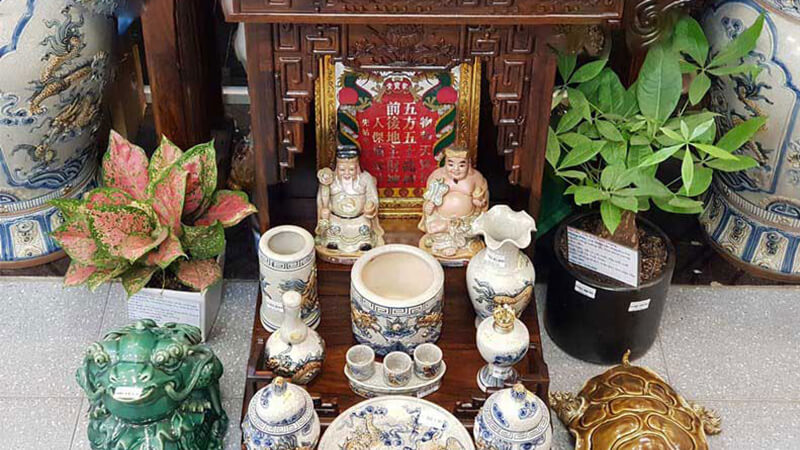 Worship of the God of Wealth and Earth God brings prosperity and good fortune.
Worship of the God of Wealth and Earth God brings prosperity and good fortune.
According to ancient folklore, the God of Wealth is a celestial deity who presides over finances. Legend has it that, on one occasion, while inebriated, he fell to earth and bestowed good luck and abundance upon the households he visited. As a result, people hold the belief that paying homage to the God of Wealth holds immense significance.
For generations, individuals have worshipped the God of Wealth and Earth God, beseeching them for prosperity and success in their ventures. This tradition is particularly prevalent among families involved in business, who accord special attention and devotion to the worship of the God of Wealth, trusting that it will attract greater wealth and favorable luck to their pursuits.
For further exploration: Does 2024 fall on a leap year? What should one offer on the God of Wealth’s birthday?
2 Should the altar to the God of Wealth be replaced?
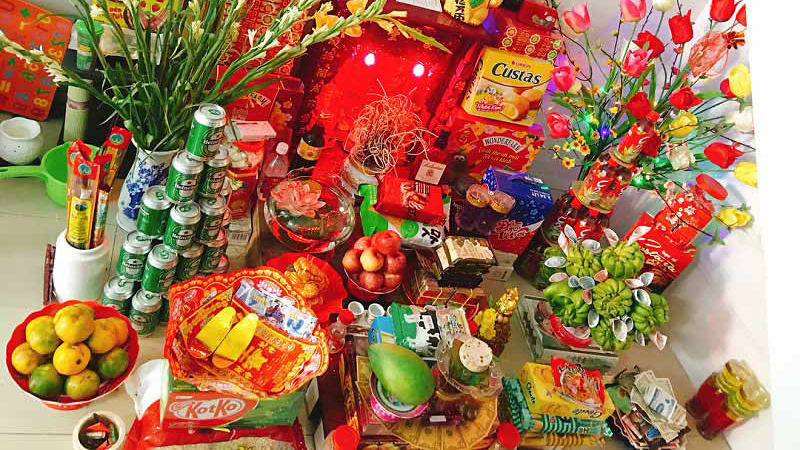 In certain circumstances, replacing the altar is necessary for the God of Wealth to bestow greater abundance.
In certain circumstances, replacing the altar is necessary for the God of Wealth to bestow greater abundance.
The altar dedicated to the God of Wealth is a sacred space that ushers in prosperity and good fortune for the homeowner. It serves as a means for the homeowner to express their reverence and gratitude to the deities.
However, there are instances when erecting a new altar becomes necessary to uphold the sanctity of the divine. Many hold the belief that substituting an old and decrepit altar with a new and pristine one is advantageous, as it will encourage the God of Wealth to confer even more abundance upon the household.
3 When should the altar to the God of Wealth be replaced?
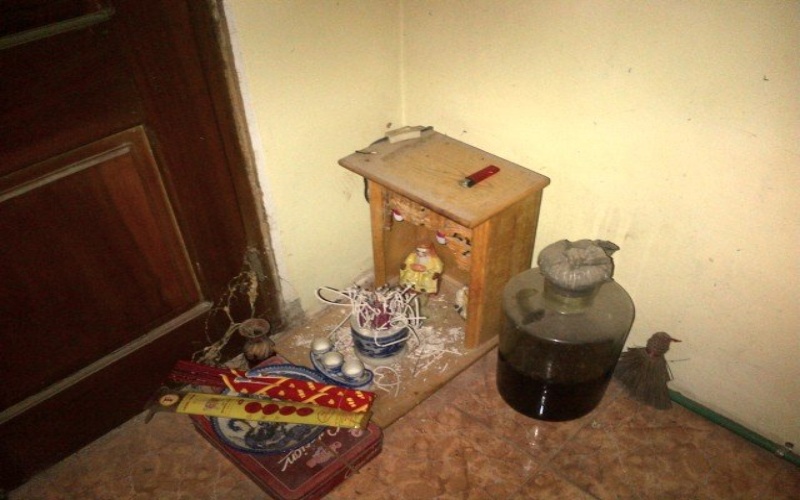 Altars to the God of Wealth that have become aged and worn out need to be renewed.
Altars to the God of Wealth that have become aged and worn out need to be renewed.
There are several reasons why a homeowner may consider replacing the altar to the God of Wealth, including termite infestation, water damage, or a relocation to a new residence, shop, or company, which necessitates moving the place of worship.
Additionally, to attract more wealth and good fortune in business ventures, many homeowners may want to adjust the feng shui of the altar for improved luck.
4 What is the best day to replace the altar to the God of Wealth?
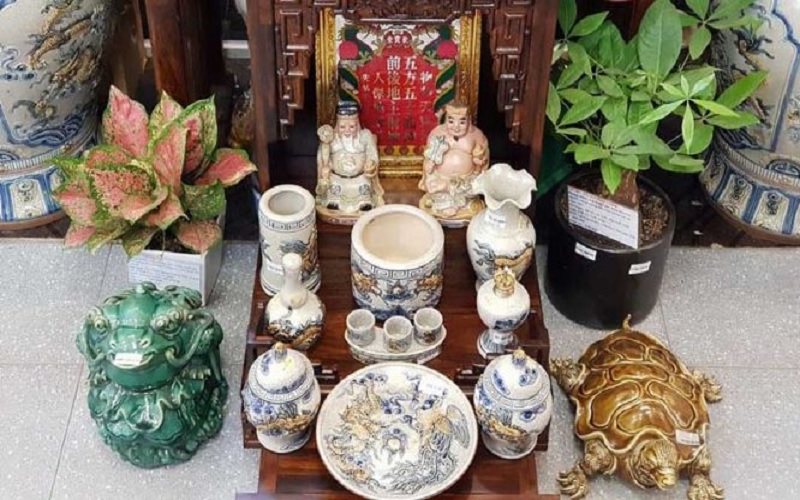 Choosing an auspicious day to replace the altar is of utmost importance.
Choosing an auspicious day to replace the altar is of utmost importance.
An auspicious day should meet the following criteria:
– Refrain from choosing days of significant taboos such as the three-nang day, the day of killing the master, the day of no souls, and other days as advised by monks or astrological guides.
– Select a day that aligns with the homeowner’s age and destiny
– Avoid replacing the altar during the seventh lunar month, which is considered the month of the hungry ghosts.
Typically, families opt to renew the altar to the God of Wealth towards the end of the year, hoping to welcome the new year with good fortune and leave behind any ill luck. However, depending on individual circumstances, the altar may be replaced at other times, such as when moving to a new residence or if the existing altar is damaged, rather than waiting until the year’s end.
5 Guide to the procedures for replacing the altar to the God of Wealth to invite prosperity
Rituals for disposing of the old altar to the God of Wealth
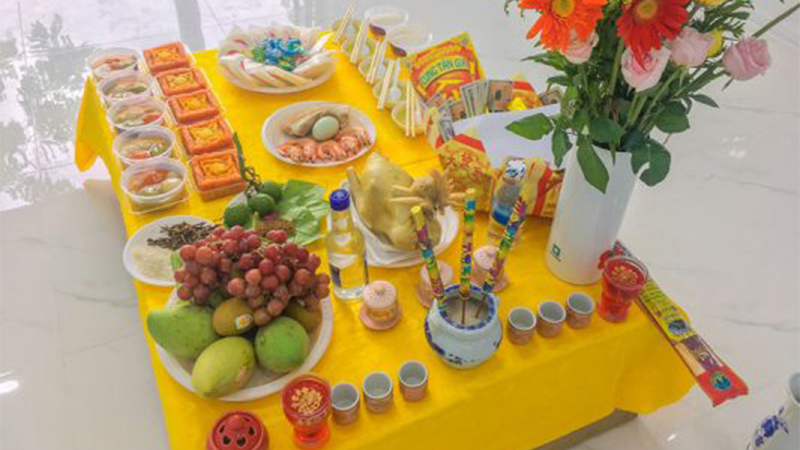 Disposing of the old altar follows specific feng shui rituals.
Disposing of the old altar follows specific feng shui rituals.
When disposing of the old altar to the God of Wealth, it is imperative to perform a ritual. Prepare offerings such as sticky rice, pork sausage, boiled chicken, white wine, white rice, a colorful assortment of fruits, betel and areca nuts, incense sticks, and gold and silver paper money.
How to handle the old altar to the God of Wealth
 Proper procedures must be followed when disposing of and replacing the altar.
Proper procedures must be followed when disposing of and replacing the altar.
Disposing of and replacing the altar to the God of Wealth demands careful attention to detail and sincerity from the homeowner. Therefore, the following steps should be observed when replacing the old altar:
– The homeowner should bow thrice before the altar, seeking permission from the deities to dismantle it. Before setting up a new altar, the homeowner needs to prepare a full meal as an offering to the ancestors and deities.
– If the altar is made of wood, the homeowner should burn it and scatter the ashes in a nearby pond or lake as a token of respect for the items that have served their purpose.
– When moving the incense pot to another location, the homeowner should cover it with a red cloth to prevent wandering spirits from entering.
– Additionally, the homeowner should take care not to confuse the incense pot of the God of Wealth with those of other deities. Once the incense stick has burned out, it can be burned alongside the gold and silver paper money and then released with the other items used in worship.
Moving the altar to a new location
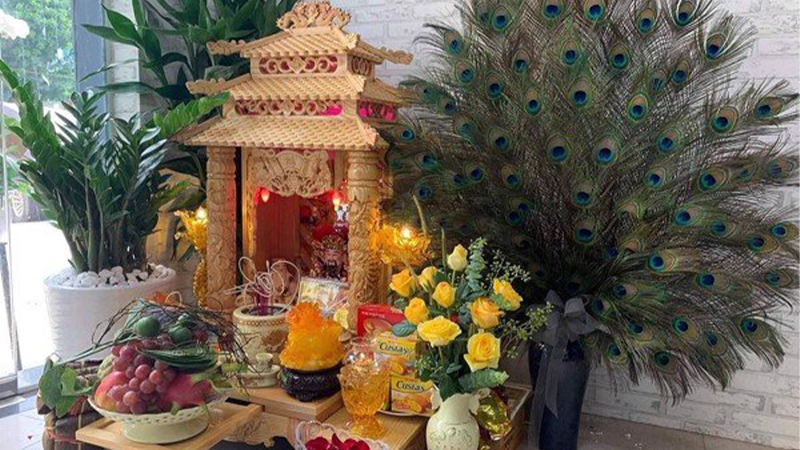 Relocating the altar to a new home requires careful consideration.
Relocating the altar to a new home requires careful consideration.
Here are some important points to keep in mind when moving the altar to a new residence:
-
Before relocating the altar to a new house, it is customary to prepare offerings to worship the land and earth god a day in advance.
-
The homeowner should stand before the altar and bow thrice, requesting permission from the deities to move to a new place of worship.
-
When moving the altar, prepare incense, candles, tea, and fruits, not only for the altar to the God of Wealth and Earth God but also for the altars to the ancestors and other deities, so they may witness the God of Wealth receiving the offerings and being invited to the new location.
-
When transferring the incense pot to the new altar, use a red cloth to cover it and prevent exposure, as this may attract negative spirits. Take special care not to confuse the incense pot of the God of Wealth and Earth God with those of other deities.
-
After setting up the new altar, use a clean cloth dipped in ginger wine to purify and bless the new altar. Then, perform a ritual to consecrate the new altar.
Rituals for replacing the altar to the God of Wealth with a new one
 Specific rituals are followed when replacing the altar with a new one.
Specific rituals are followed when replacing the altar with a new one.
To replace the altar with a new one, the homeowner should first select an auspicious day that aligns with their age and feng shui, or follow the folk tradition of choosing the full moon day of the lunar month. Then, they should procure an altar that fits the available space.
Unlike the offerings made during the ritual to dispose of the old altar, the offerings for the ritual to replace the altar include: a bouquet of five roses, a plate of betel and areca nuts (one areca nut and three betel leaves), a ceremonial chicken, a bowl of clean water, a plate of sticky rice with beans, a bottle of white wine, a plate of fruits, a gold ingot, a thousand gold and silver paper money, a prayer to the God of Wealth, a red horse, a yellow horse, a full set of hats, swords, and clothing for the horses, gold and silver paper money, a set of red clothes, and a set of yellow clothes to match the horses’ colors.
Once the new altar is set up and the feng shui arrangements are complete, the homeowner should light incense and invite the God of Wealth to the new altar. If the homeowner is unsure about how to replace the altar, they can seek guidance from a feng shui master to determine the optimal location.
Prayer for replacing the altar to the God of Wealth
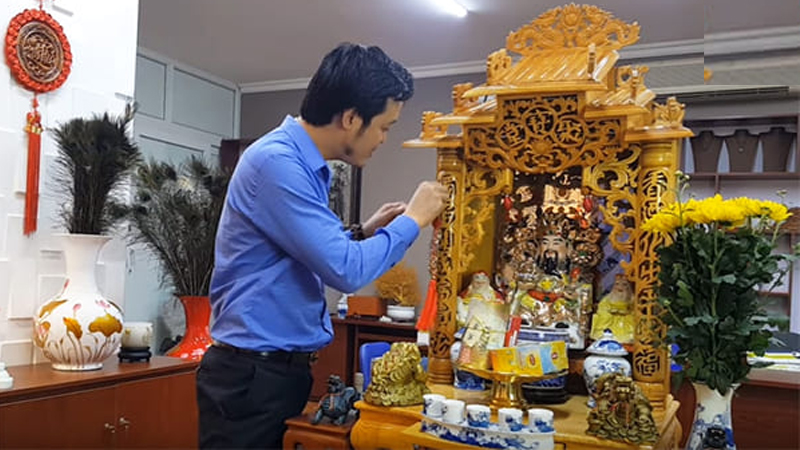 The prayer is an integral part of replacing the altar.
The prayer is an integral part of replacing the altar.
When replacing the altar to the God of Wealth, the prayer is a crucial component that cannot be overlooked. It is considered a solemn plea from the homeowner to the deities.
The following is the prayer:
Today, on the … day of the … month of the … year (lunar calendar)
My name is …, and I reside at …
On this auspicious day, filled with favorable signs, I humbly request permission to replace the old altar with a new and larger one to facilitate the offering of food and other ritual items.
I respectfully invite the Earth God and the God of Wealth, as well as the upper, middle, and lower deities, to take their seats on the incense burner on the new altar, so that they may bless me with good health, longevity, peace, and success in all my endeavors.
Finally, after reciting the prayer, wait for the incense to burn out, and then burn the gold and silver paper money and the prayer. Sprinkle rice and wine at the doorstep to conclude the ritual for replacing the altar to the Earth God with a new one.
6 Important notes when performing the ritual for replacing the altar to the God of Wealth with a new one
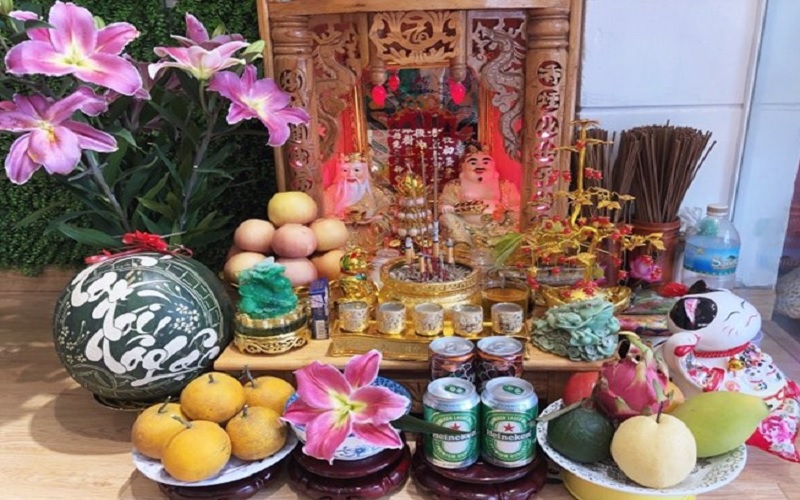 Some key considerations when replacing the altar.
Some key considerations when replacing the altar.
– When replacing the altar with a new one, avoid doing so during the seventh lunar month, which is believed to be inauspicious.
– Dispose of the old altar by burning it and releasing the ashes into a river, rather than discarding them in a landfill. Doing so is considered taboo and may negatively impact the homeowner’s business.
– While it is possible to replace the items on the altar dedicated to the Earth God, the incense pot must be retained as it is the dwelling place of the God of Wealth.
– If moving to a new residence, ensure that all interior decorations are complete before bringing in the new altar to avoid frequent relocations of the place of worship.
– Minimize any adjustments to the position of the altar during and after the replacement process.
– Pay attention to the feng shui orientation of the altar to ensure it aligns with auspicious directions.
– Consider choosing the full moon or the first day of the lunar month, which are considered auspicious days for worship, to report the replacement of the altar.
– When moving the altar, the homeowner should cover the incense pot, statues, and other items with a cloth to avoid exposure.





































